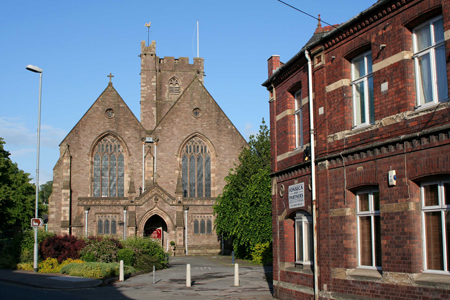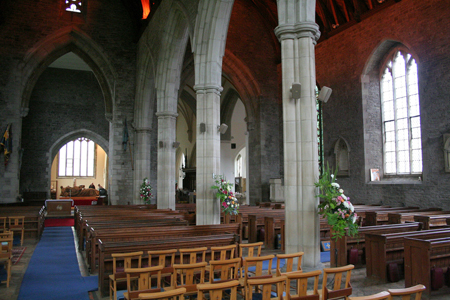| |
 |
 |
 |
| Comment on this report, or find other reports. |
 |
| Our Mystery Worshippers are volunteers who warm church pews for us around the world. If you'd like to become a Mystery Worshipper, start here. |
 |
| Find out how to reproduce this report in your church magazine or website. |
|
|
| 1746: St Mary's
Priory, Abergavenny, Wales |
 |

Photo: roath_park_mark |
 |
Mystery Worshipper:
Chris Churchcrawler.
The church:
St
Mary's Priory, Abergavenny, Wales.
Denomination:
The
Church in Wales, Diocese
of Monmouth.
The building:
A stately church of some size, in pristine condition. The
present building dates from the 14th century, with very little
of an earlier structure surviving. Its original layout was
cruciform, with Herefordshire windows (three lancets
under one arch) and a central
tower of ten bells. Extensive renovations in the early 19th
century rendered the original plan almost unrecognisable.
In 1882 a thorough restoration was begun, following the original
lines as far as possible. But much remains to be done. St
Mary's treasures include some of the finest examples of medieval
tombs, effigies and sculptures to be found anywhere. One of
the effigies bears the inscription: "We all to dust will
go. Who knows what we will be?" – a cheerful thought!
Especially notable is the Jesse, a large wooden carving once
part of an even larger carving depicting the lineage of Jesus
Christ.
The church:
The Benedictine priory at Abergavenny was established at the
end of the 11th century. After Henry VIII dissolved the monasteries,
the priory church became the parish church for this small
South Wales town. The church seems to have a variety of newly
built venues for social activities, from singing to cheese
tasting. Holy eucharist is celebrated each weekday, with three
celebrations plus evensong on Sundays.
The neighbourhood:
Abergavenny, called the gateway to South Wales, is situated
just south of the Black Mountains, part of the Brecon Beacons
National Park. The town is ringed by a series of mountains
and hills, the most notable of which is called Sugar Loaf.
Abergavenny hosts a thriving business community.
The cast:
The Revd Canon Jeremy H. Winston, vicar; the Revd Dr John
Plessis, curate.
The date & time:
14 June 2009, 6.00pm.
What was the name of
the service?
Evensong and Sermon.
How full was the building?
About 40 spread across a huge church. Not bad for a small
town. All appeared to be of upper middle class, although of
course one can't always tell. Certainly the congregation didn't
seem to reflect the bikers and young people outside the building.
Did anyone welcome you
personally?
A friendly church warden greeted me and we had a chat about
the organ. Also, the vicar and curate were very warm. However,
everybody else kept to themselves in time-honoured Anglican
fashion – no eye contact or anything! One or two people
wished me a good evening, but nothing else.
Was your pew comfortable?
It did the job!
How would you describe
the pre-service atmosphere?
Reverential. I stupidly took a seat in the front, forgetting
that Anglican custom would expect me to sit toward the back
along with everyone else. Very embarrassing!
What were the exact
opening words of the service?
"Let's begin with hymn 112."
What books did the congregation
use during the service?
Hymns for Today's Church and Book of Common Prayer
for the Church in Wales.
What musical instruments
were played?
The pipe organ has been gone for over 10 years. The current
organ is an electronic thing and not the best type by the
looks of it, although it sounded great. The young organist
appeared very competent. I'm quite astounded that a small
town can muster up such good quality music.

Photo: roath_park_mark
Did anything distract
you?
How well dressed everybody was – which was to become
a theme of the sermon. It seemed that the upper classes of
this part of Wales were here in force. I wondered whether
this was a Church in Wales peculiarity or whether the nonconformist
churches (of which there is a very long history here) had
similar people in attendance.
Was the worship stiff-upper-lip,
happy clappy, or what?
Modern Catholic, but not extreme! No incense. Modern language.
There was some mention of the Walsingham pilgrimage and statues
of Mary.
Exactly how long was
the sermon?
20 minutes.
On a scale of 1-10,
how good was the preacher?
8 – The vicar delivered an intelligent and well thought
out sermon – rather like some of the academic theological
lectures I attended at Lampeter. He was quietly controversial
and certainly thought provoking. I liked his honesty.
In a nutshell, what
was the sermon about?
He began by saying that there was a dress code for this church
– people are not expected to come to church in shorts.
(I had been out all afternoon and was in dark jeans and a
red t-shirt; everybody else was dressed as if they had stepped
out of Savile Row.) Those churches who do not keep up certain
traditions and standards are putting God down to man's level.
God is not cute and cuddly in the way that some churches imply.
As CS Lewis said: God is not tame; there are some aspects
of God that are scary. We must return to the Victorian respect
for God rather than persist in trying to humanise God.
Which part of the service
was like being in heaven?
The vicar's thoughtful sermon, which echoed around this ancient
place. The music and style of service were good, although
I would have preferred the old 1662 language.
And which part was like
being in... er... the other place?
The vicar's mention of dress code. It made me feel very self-conscious.
If this were my first time ever inside a church, I would have
run a mile and never come back. However, I do take his point.
But talking about a dress code ignores the real problem: all
those less well dressed people outside (hundreds of bikers)
and young people are not in church – or they just bike
on down to the Baptist church dressed as they are.
What happened when you
hung around after the service looking lost?
I spoke again with the sidesman and the vicar, who were very
welcoming and cheerful. I would have liked to have spent more
time with the vicar discussing his sermon. But everybody else
avoided eye contact – I must have stood out a mile in
my jeans and t-shirt.
How would you describe
the after-service coffee?
Nothing offered. Straight from the pew to the street.
How would you feel about
making this church your regular (where 10 = ecstatic, 0 =
terminal)?
7 – I would find it difficult adhering to the dress code.
I share the sentiment expressed by John Frost, Welsh hero
and leader of the British Chartist movement: "I do not
measure the worth of a man by the cut of his cloth or the
money in his purse."
Did the service make
you feel glad to be a Christian?
Yes, but a somewhat elitist one. My background is United Reformed
Church, which welcomes anybody wearing anything not incompatible
with the gospel. I would want to see some of those bikers
and young people in church.
What one thing will
you remember about all this in seven days' time?
The vicar's warm welcome, but also his comments about dress
code!
|
|
|
 |
 |
 |
| We rely on voluntary donations to stay online. If you're a regular visitor to Ship of Fools, please consider supporting us. |
 |
 |
 |
| The Mystery Pilgrim |
 |
| One of our most seasoned reporters makes the Camino pilgrimage to Santiago de Compostela in Spain. Read here. |
 |
 |
 |
| London churches |
 |
| Read reports from 70 London churches, visited by a small army of Mystery Worshippers on one single Sunday. Read here. |
| |
|
|
|
|


